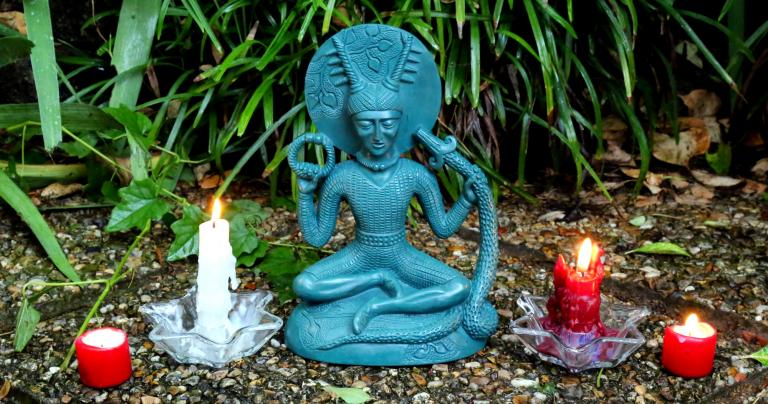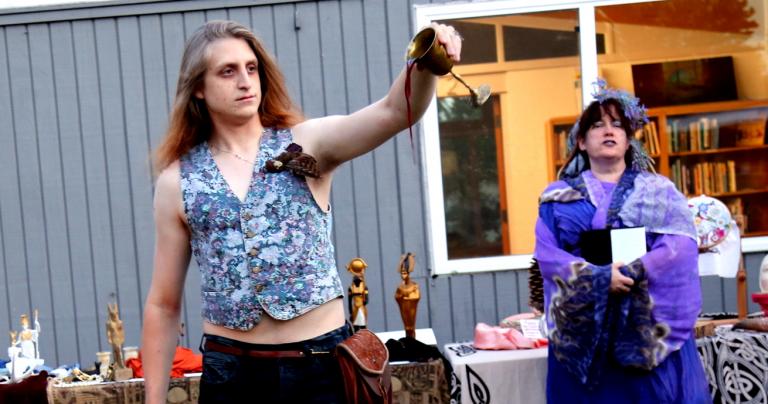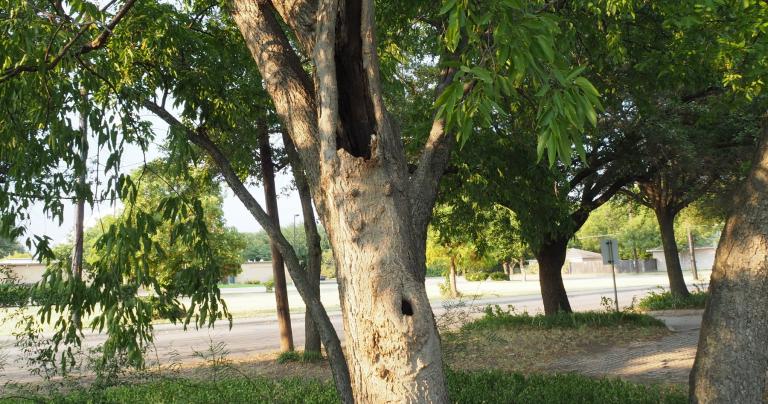We’ve been talking a lot about Pagan priesthood lately, and it appears we’re not done yet.
In a Facebook comment to last week’s 15 Roles of Pagan Priesthood – How Many Is Too Many? Brittany Beaulac asked:
With how unique each of our paths branch out individually, and how spread out we can be, how does one become a priest/ess of their particular deity? How does one work toward this specific goal with sincerity and authenticity without the availability of other clergy members?
This is a very good and very relevant question.
If you want to be a recognized chaplain, you can attend Cherry Hill Seminary. If you want to be an ADF priest, you can join ADF and begin their Clergy Training Program. Some other organizations and traditions have their own programs. And those are great – if you want to be a priest in their tradition.
But what if Apollo appears before you – in one way or another – and says “I want you to be my priest”? Or Brighid or Freya or Horus… or perhaps Cernunnos, who if He even had priests in ancient times we know nothing of them? I have some first-hand experience with that…
There are some priesthoods devoted to specific deities that have been started over the past few years, most notably the Coru Cathubodua Priesthood of the Morrigan. But these groups are few and far between, they tend to be local to one area, and of course, they serve one specific deity.
Meanwhile, you’re sitting in the middle of Nebraska wondering how you’re going to respond to this call. You really want to say “yes!” But you don’t know how to do it, or even if you can do it.
You can.
Discernment
Before you can figure out how to get there, you first have to figure out where it is you want to go. That process is called discernment.
Who is calling you? What are They calling you to do? Who are They calling you to do it with, and for? How many of those 15 roles of Pagan priesthood are you going to try to fill? Or are you going to be a priest who serves your God and only that God? Figuring this out is your first and most important task.
But don’t wait until it’s complete to start doing the things that priests do.
Spiritual practice
Do I talk about spiritual practice too much? No, I just talk about it a lot, because it’s that important – whether you’re a priest, a non-priestly devotee, or an ordinary person trying to live the best life you can live.
No one needs to be a priest in order to approach a God. That means neither do priests-in-training or maybe-priests-in-discernment. So you can start approaching and honoring your God now. Do it.
Prayer is speaking to the Gods, either words of praise or expressing the yearnings of your heart. If you’re trying to figure out how to become a priest – or what kind of priest you’re supposed to become – you’re going to have a lot of questions. Ask them. Ask for guidance. Ask that obstacles be removed and that ways be opened.
Mediation is listening for the Gods, and contemplating Their virtues and values. Sometimes They answer our questions directly. Many more times They answer them in ways we struggle to understand – but at least you have an answer. And spending time contemplating Them and Their essence helps us become more like Them, which for a would-be priest is a very good thing (and also for everyone else).
Offerings are an expression of hospitality and of reciprocity. The Gods give to us, so we give to Them, so They will give to us again. I make weekly offerings to the deities to whom I am oathed – you may need to do more or less.
There are other forms of spiritual practice, but these are the foundation – particularly for priests.
Find the others
Trying to do something so deep and mysterious as become the priest of an ancient God can feel isolating. Nobody knows what you’re going through. Perhaps nobody’s been a priest of this deity in over a thousand years.
Perhaps. But not likely. There are others like you – people who have heard the call of a deity and are doing their best to respond. They don’t have all the answers any more than you do. But they may have an answer you need… and you may have an answer they need.
Find them.
Look on the internet – Google is a wonderful tool. Search Facebook and Twitter. If you’re on one of the other social media sites, try them as well.
Yes, there’s a lot of crap on the internet. Yes, a lot of people who call themselves priests have claimed the title without doing the work to back it up. Part of discernment is figuring out who can help you and who can’t.
Look for relevant books. Scholarly polytheist works like The Book of the Great Queen and Harp, Club & Cauldron are rare. Devotional anthologies like Bearing Torches: A Devotional Anthology for Hekate are more common. Their material can be helpful.
So can their writers. They’re all ordinary Pagans like you and me. They probably won’t take you on as an apprentice (for many reasons) but they can point you toward helpful resources and practices.
Not everybody can afford to travel to conferences and retreats, but if you can, they’re great places to have the kind of conversations you can’t have anywhere else. I’ll be at Mystic South in Atlanta in July. So will several other experienced priests that I know, and probably a bunch more I don’t know. Buy us a cup of coffee (tea for me, please) and most of us will talk longer than you care to listen.
Historical and cultural studies
The Gods transcend human societies, but religious institutions – including priesthood – always exist in the context of the culture of the people who create and maintain them.
Your priesthood will necessarily exist in the context of 21st century America (or Britain or Ireland or where ever you live and serve). And that’s not the same as ancient Greece or pre-Christian Norway or Pharaonic Egypt. Nor is it the same as the contemporary cultures of those lands. If you attempt to ground ancient practices in how people live where you are right now, you’re going to make a critical error.
Understanding the land and the people provides context for that worship. It helps you understand not just what ancient priests did, but why they did it, and what it meant. And that helps you decide if a particular aspect of an ancient priesthood is relevant to yours or not.
In general, there are far more scholarly references on ancient history and culture than there are on ancient religion, much less on ancient theology. Most of that is written from a decidedly non-theistic viewpoint, but that’s OK – you’re after facts, not interpretations.
Learn as much as you can about the land and the people where the deity who called you was originally worshipped. And never forget your priesthood does not make you (for example) an Egyptian. It makes you the priest of an Egyptian deity.
Your work is here – where ever “here” is for you – and now.
Find the others, part 2
If you’re called by an Egyptian deity, you’re in luck. The Egyptians wrote everything down, and much of it was preserved. We have less from the Greeks, but if you really were called by Apollo you’re still in pretty good shape. If you were called by a Celtic deity, there’s not much. And for some – like Cernunnos – all we have is a name and a couple of images.
Fortunately for us, religion has never been practiced in a vacuum. Syncretism, borrowing, and stealing from your neighbors has been going on forever. If there’s no historical information about how your God was understood and worshipped, look to neighboring cultures. How did they do things?
You can do the same thing with contemporary priesthoods – “polytheist tech” is remarkably similar from tradition to tradition. Prayer, meditation, and offerings don’t change much. Oracular traditions – how the Gods speak to us – don’t change much. The needs of communities don’t change much.
I can’t tell you how to be a priest of Apollo. But I can tell you how I’m a priest of Cernunnos, and there may be things I do that you can adapt to your own priesthood. Tech is transferrable.
Don’t do any of this until you’ve done the historical and cultural studies as described above. Some things can’t be substituted well, and others can’t be substituted at all. You want to splice in frog DNA (ala Jurassic Park), not lift whole systems that may or may not fit.
But where the information you need either isn’t available or flat-out doesn’t exist, tapping likely sources is better than giving up.
Take your vows
At some point you realize that it’s time. Your priesthood-in-progress isn’t finished and it certainly isn’t perfect, but you’re doing the work. And more importantly, you intend to keep doing the work.
Write your vows. Say what you will do, what you won’t do, and how long you’ll do it. Don’t make promises you can’t or won’t keep, but don’t make them so weak as to be meaningless either.
Are the vows acceptable? Confirm them with divination, preferably by an independent diviner who’s either a polytheist themselves, or who at least understands the concept of a formal relationship between a deity and a priest.
Then take your vows. It need not be an elaborate ceremony, but gather a few friends to help you, and to serve as witnesses.
The vows won’t make you any more ready. But they’ll serve as a continuous reminder of your commitment, and your desire to fulfill it.
The first of your tradition
My Druid tradition is 300 years old, and we have interrupted but still very real roots going back 2000 years before that. There is great meaning in participating in an ancient tradition.
My priesthood of Cernunnos, on the other hand, goes back to 2007, or possibly 2005, or maybe 1962. I am not the first priest of Cernunnos, but I am the first – and only – priest of Cernunnos in this tradition.
Someone had to be first in every tradition.
Someone was the first priest of Apollo. Someone was the first oracle at His temple at Delphi. Maybe there was a “graduating class” of priests and oracles who were consecrated at the same time, but if so, each of them was still doing what you’re doing – which is something that hadn’t been done before.
It is easier to become a priest and to serve as a priest inside a community. If you can train under an experienced and qualified priest, so much the better.
But if a God calls you, and you do the work, and the deity accepts your service, then you’re Their priest.


















